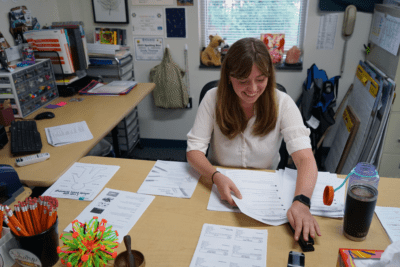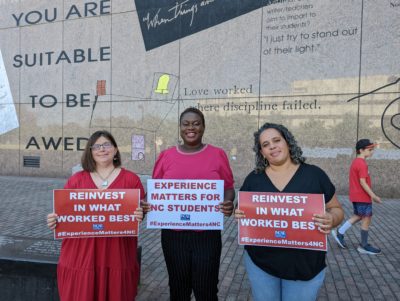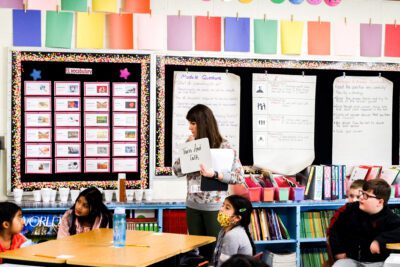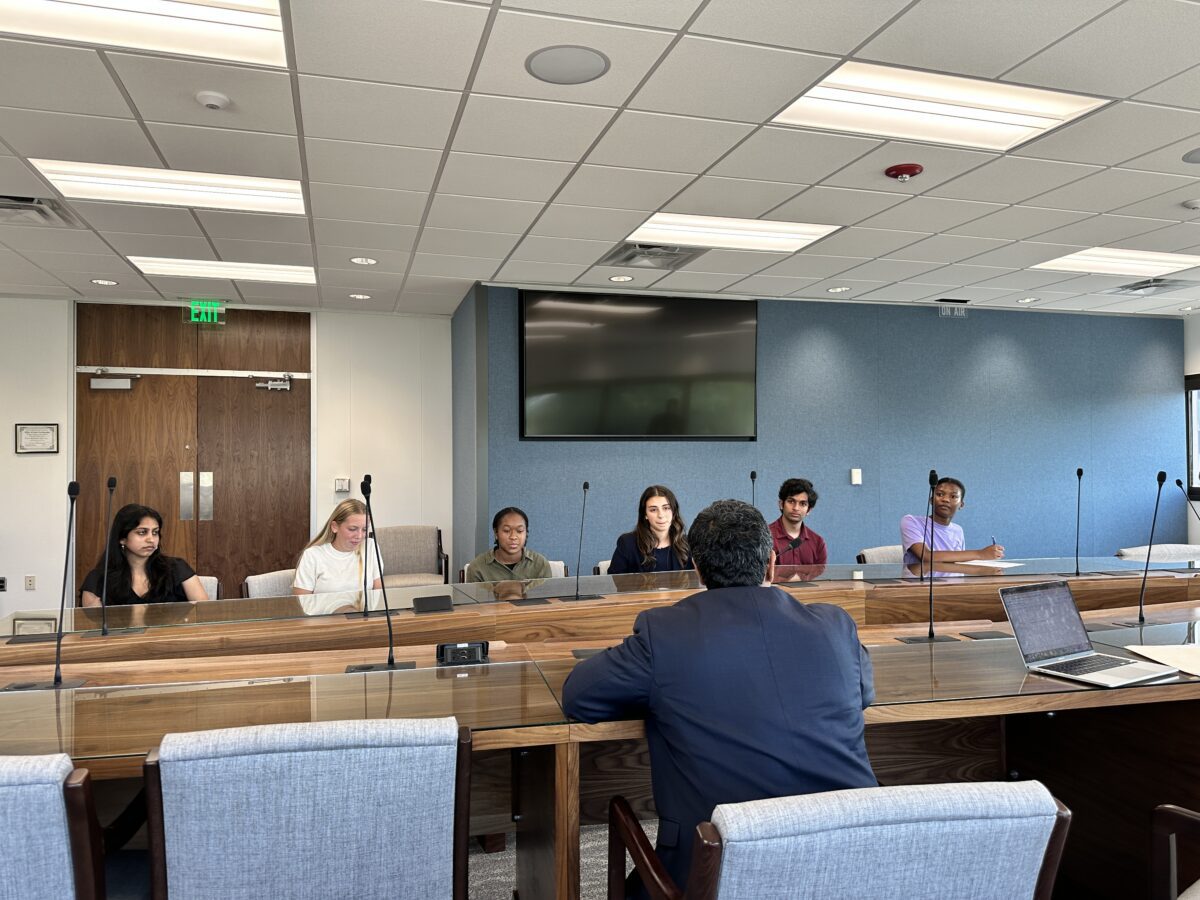

|
|
After the Parkland school shooting in 2018, state Sen. Jay Chaudhuri, D-Wake, sponsored a gun reform bill — and got invitations to school violence protests across his district. He decided to convene a roundtable of students to hear about their education experiences and school safety. Now, he does it every year.
Last week, as students were still settling into a new school year, he invited a group of six to join him in a conference room at the legislative office building next to the General Assembly.
“I think you see the importance of facilitating conversations with students from different backgrounds and the impact it can make and how they’re looking at the world,” Chaudhuri said.
A few things stuck out. When Chaudhuri asked about challenges, the students listed many. Mental health came up most, followed by school safety and concerns for fellow students who identify as LGBTQ+.
When asked about successes, each student mentioned the same one: their teachers.
Another thing was apparent: The students are well aware of the political discord surrounding education. In a conversation overheard before the meeting, a charter school student spoke to a traditional public school student about opportunities she had. Their abundance surprised the traditional public student.
“Well, the General Assembly loves charter schools,” the charter student said.
“Oh, they hate us,” the traditional public student said.
The takeaway: Students have certain perceptions about what the General Assembly cares about and – perhaps more important – what it doesn’t. That’s a distinctive insight into the minds of the most important stakeholders in the education system: the students.
Who are the students?
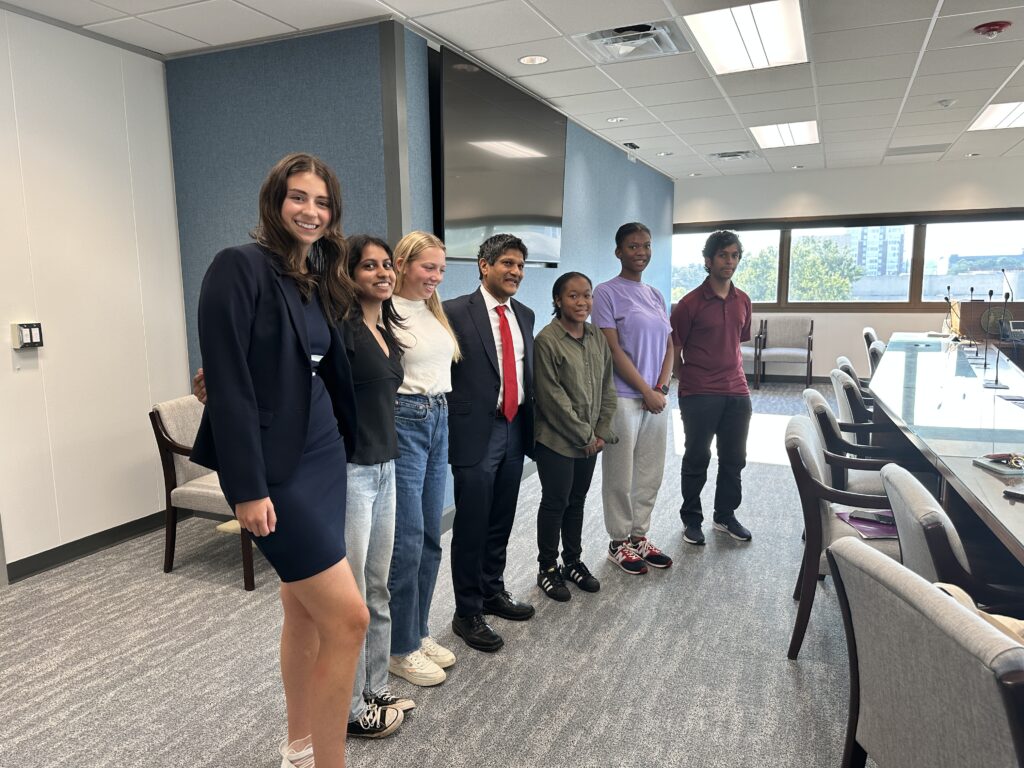

Chaudhuri’s office reached out to area high schools and let them pick students to attend. The schools tended to pick their high fliers. Several are taking AP classes or are in the International Baccalaureate program. Many were student body president at their schools.
- Pari Sidana, senior, Raleigh Charter High School
- Colleen Bailey, senior, Cary High School
- Myasia Minor, junior, Southeast Raleigh High School
- Natalie Gonzalez, senior, Millbrook High School
- Jaden Menezes, senior, Enloe High School
- Sheba Gage, senior, Broughton High School
Here’s what they had to say:
On mental health
Gonzalez: “One of the challenges, I think, is this pressure to have a perfect resume as a student. I don’t know about you guys, but at my school we have all kind of reached a general consensus of, ‘I feel like I’m never doing enough.’ There’s not only pressure to have a good GPA and good test scores, but also to be involved in so many different extracurriculars and have outside community service and play sports, and all that can put a lot of pressure on a student. So I think there are some outside pressures because of the increasingly competitive college admission process.”
The pressure some students feel to get A’s can drive cheating, one student said.
Menezes: “For a lot of people, what they’ve learned about school is it’s this thing they have to go through and then be perfect with. So the only reasonable, logical thing is, well, if I need to get an A, the only way to get an A is to make sure I get an A by cheating. And that’s frustrating for me, personally, just as someone who genuinely enjoys their classes or wants to learn in their classes, because it’s effectively made impossible with the amount of stuff that’s there.”
Gonzales: “I think that one thing that could be improved is our amount of counselors and school psychologists. We have very few counselors, in my opinion, in comparison to how large our student body is. And I think because of that, it can be kind of difficult to come forward with an issue you’re having because it’s like: What if someone else has bigger problems than I do? And there’s such few counselors, I don’t know if I can build that close a relationship with them. So I think having more school psychologists and more mental health resources can be very beneficial.”
Gage: “And I also think it just goes back to the stigma surrounding mental health. A lot of my friends, including myself, we just don’t feel comfortable saying exactly how we feel because we feel like we’ll be put to shame or thought differently about, and we don’t want to be thought of in that light and there being something wrong with us because we’re always trying to be perfect.”
On school safety
Bailey: “I think we talk about not being safe a lot at my school. I feel like it’s an ongoing conversation at our school.”
Gonzalez: “One thing that I think can be improved is, people need to take the lockdown drills more seriously in high school. I don’t know how it is for you guys, but whenever there’s a lockdown drill, I feel like both teachers and students can take more action in taking those seriously. Especially because shootings (are) still a prevalent issue today.”
Sidana: “I think one thing that’s been really frustrating for me, and I know some of my friends as well, is, it seems like legislatures – our state legislature and even at the federal level, too – aren’t listening to students and aren’t listening to our concerns about safety.”
Menezes: “I want to care, and I want to push legislators to do stuff, but they know – there’s no way they don’t know. It’s not like they’re ignorant. They’re choosing not to act on what we want to happen. So I don’t know. That’s the general sentiment for me and friends that care and are interested in the issues. We could invest time and energy into it, but, ultimately, we’ve done that before and it hasn’t worked.”
On Parents’ Bill of Rights, gender, and sexuality
The students talked about the state’s recently enacted Parents’ Bill of Rights and one of its provisions, which requires that, with some exceptions to protect students’ safety, parents be notified “prior to any changes in the name or pronoun used for a student in school records or by school personnel.”
Minor: “I actually know a lot of students that go by different pronouns, and they feel like they’re in danger.”
Sidana: “Something that I was really concerned about is for my queer friends and friends who are in the LGBTQ+ community. Right now, they’re at the risk of being outed by teachers. I do go to a charter school, and the lawyers of the school are trying to figure out what it means, what the bills mean for the school.”
Bailey: “In my school, they made a separate announcement and I feel like they were uncomfortable making this announcement. They didn’t want to, personally, follow through with the law and they expressed that and they were apologizing.”
Gage: “I have had one teacher who brought it up — it was my chorus teacher. And she was saying that – on the Google Form that she has us do at the beginning of the school year – in previous years, she asked us for our pronouns. Just so she knew and respected our wishes. But she did not put that on there this year, to protect her students.”
Menezes: “I think that not having some sort of general understanding about how it’s working makes it worse than it already is because we just don’t know what to be doing, how to protect our friends, or how teachers are supposed to be acting.”
On what they would do if they sat in the General Assembly
Menezes: “If I were in the General Assembly, I would be focusing on making sure that, generally, people are getting the same resources throughout the system.”
Bailey: “Equal resources for all students. You see the same people in AP classes every single time, and they’re all white. And we have like 50% of our student body is people of color. And somehow all of (the AP students) are all white. I don’t understand how that could be unless resources at a younger level, like middle school or elementary school, were not equally provided.”
Gage: “I think an educational issue that I would focus on is probably the pressure that students feel just to be perfect. It’s kind of like the mental health issue, but I think there hasn’t really been anything that the General Assembly or anybody has done to try and reduce that pressure that students feel.”
Gonzalez: “One issue that has been very prevalent among my school, and I believe it’s a county thing, is the lack of reliable transportation when it comes to bus routes. Every day we hear the announcements – buses da, da, da do not have drivers today, please make other arrangements for transportation. I’m fortunate enough to have the privilege to drive myself to and from school, but a lot of students do not have that same privilege. And I think that’s something that needs to be addressed.”
Minor: “The one thing that I would want to focus on, and we talked about it earlier, but my school has a psychologist and they have counselors, and nobody in my school – I went around and asked – nobody in my school knew we had a school psychologist.”
Sidana: “I would definitely say repealing the Don’t Say Gay bill and protecting LGBTQ+ rights. And then also protecting DEI training. I know that our school did have a specific staff member whose focus was DEI, but now the name is ‘school culture person.’ So she’s still there, and she’s still doing much of the same stuff, in terms of helping ensure that students of color have access to the resources to succeed at Raleigh Charter.”
On what they like about their school (note the theme)
Minor: “I feel like one of the best things at my school is just how supportive my teachers are. Being in (the International Baccalaureate) program, anyway, I know that I have a lot of teachers that are always concerned about me and my mental health. But even in freshman and sophomore year, I always had teachers that were there for me or that I could talk to.”
Sidana: “I would definitely say that a lot of my teachers are very supportive at Raleigh Charter.”
Bailey: “Most of my teachers have been there for at least 15 years. And that makes quality teachers, and teachers that are committed to their students and the school. And, honestly, the experience I’ve had at my high school has been so much better than my middle school just because the teachers are that much better.”
Gonzalez: “My physics teacher is amazing. I talk about him all the time. Physics is an extremely difficult course; those tests are brutal. And one thing he offers is a remediation process. So if you miss a certain part of the test or you did really bad, he has open office hours. You can go meet with him, you submit some work, and then you retake that part of the test. I love that because it really focuses more on improvement and focuses on building skills rather than just getting perfect on your first try.”
Menezes: “The offerings at my school are very enriching and some of the teachers really genuinely do care about the classes they’re teaching. And that leads to a way better – way better – experience.”
Gage: “Sometimes the arts don’t get as much highlight as the sports, which is just pretty typical. But last year we did a pretty good job with the arts. We did a production of ‘Mean Girls’ last year, and it was my first musical, and I was Regina. My theater teacher was so supportive of me and me getting solid with the theater lingo and all that kind of stuff. And he was also supportive when I got to perform at DPAC for (Triangle Rising Stars). He was just so kind and supportive of me and he helped me through the entire process. I definitely would not have been able to go through it without him.”
On our students and on hope
“At the end of the day, I think the conversations were real, but you can’t help but be hopeful,” Chaudhuri said.
If you know of other student conversations like these happening around the state, please send them our way via mrash@ednc.org.



